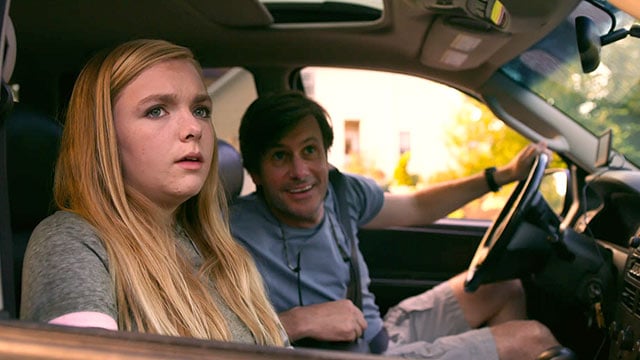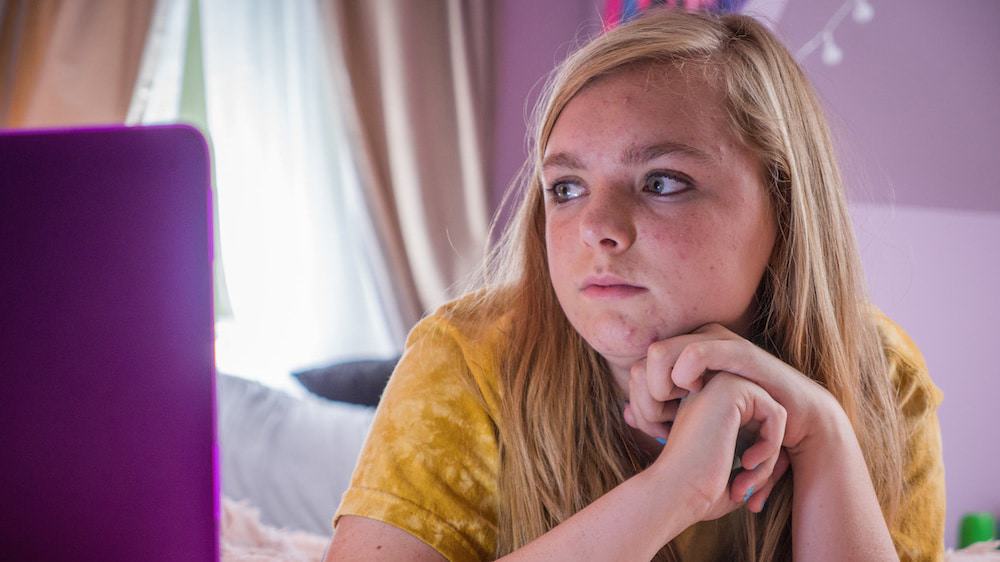
Take the tangle of complex adolescent emotions first revealed to the masses by John Hughes, mix them with Lady Bird McPherson’s preoccupation with self-definition, add in all the social dread of Carrie, and you’re about halfway to Eighth Grade, a beautiful, urgently modern take on coming-of-age from first-time narrative feature filmmaker Bo Burnham.
Despite these comparisons, Eighth Grade is a singular work of art: a story with depth and humor that manages to drop viewers squarely into the lives of present-day teens without ever feeling preachy or inauthentic. In a genre that often tempts filmmakers to step back, relying on retrospect to emphasize the relative smallness of the teen experience, Burnham instead captures middle school life with the visceral immediacy it deserves.
Fifteen-year-old Elsie Fisher (her character’s age at the time of filming) stars as Kayla, a sweet but nervous girl on the cusp of high school who is trying to gain confidence while inundated with modern technology and surrounded by classmates desperate to perform their grown-up-ness. Burnham could have easily made the internet a mustache-twirling villain—and doing so would have alienated the young audience this film will almost surely attract when it hits theaters later this year—but instead, he goes for something trickier, more subtle. In Eighth Grade, apps like Instagram, Snapchat, and YouTube are multi-purpose tools of creation and destruction, functioning as Kayla’s primary form of escape, connection, education, performance, and inevitably, self-doubt and disappointment. The result is a nerve-wracking but honest portrayal of young people’s’ relationship with the internet.
Fisher is a revelation, in part because girls like Kayla are rarely the heroes we are given on screen. She carries the movie by flawlessly embodying teen uneasiness, shrinking into herself and hiding behind a pair of headphones and a wall of blonde hair. The narrative is framed by Kayla’s largely unwatched YouTube videos, during which she makes half-baked but sincere points about topics like “Being Yourself” or “Confidence.” In these scenes, she’s, in turn, endearing, pitiful, and inspiring, putting her spin on Pinterest-quote bits of advice and punctuating sentences with “ums,” flubs, and false starts. We often get the sense that she doesn’t quite buy into her self-proclaimed positivity, but her constant attempts to fake it until she makes it grow more admirable with each video.
Whenever Eighth Grade nears a point of predictability, it pivots in a way that surprises—both upsettingly and enjoyably—without fail. A firecracker score by British electronic composer Anna Meredith is the film’s secret weapon and deserves to be talked about with the same reverence as recent jarring favorites like Annihilation, though its heart-pounding side effects seem more akin to Jaws. With Meredith’s music setting the mood, middle school becomes high suspense, and snippets of horror-like cinematography (the camera following a character over one shoulder, faces half-covered, slow pans to reveal sinister items) help remind us that during childhood, moments of all sizes can feel earth-shatteringly huge and terrifying. For Kayla, a pool party, a visit to the high school, and a game of truth or dare are all make-it-or-break-it moments, fertile ground for either wonderful or mortifying memories.
In a testament to his ability to approach teen life gently and with uncommon understanding, Burnham doesn’t simply fill up an hour and a half with personal yet ultimately insignificant vignettes. There is a good dose of teen milieu, but Kayla also encounters formative situations and has big-deal conversations, the importance of which are by no means just in her head. A brief scene of a macabre school shooting drill embodies Burnham’s apparent central question—what does growing up right now do to people?—while relationships boiled down to transactional Instagram comments and Snapchat exchanges complicate an already murky, uncomfortable answer.

When it’s not quietly tragic, Eighth Grade is also frequently hilarious (the off-putting and straight up bizarre habits of teenage boys are a recurring theme), but most of all it’s heart-achingly relatable. Kayla wants more than anything to be beyond this part of her life, to wake up a new person in a new time with a better understanding of herself and the messy world around her. She works towards this future version of Kayla relentlessly, painting her nails Instagram-inspired colors, framing her mirror with notes on self-improvement, and doing her hair to take a “just woke up” selfie in hopes of catching the cool kids’ attention. More often than not, Kayla’s hard work goes unnoticed, but her unflagging optimism is self-soothing, a healing salve not only for herself but for us, viewers in 2018 who are painfully aware that adolescence and the year we live in add up to double the potential for soul-crushing and cynicism.
Kayla’s father is the film’s lone significant adult character, played with dorky charm by Josh Hamilton. He’s there for Kayla throughout her tumultuous last few weeks of eighth grade, but for the most part, she fails to recognize his love as anything but embarrassing. Trapped in an overwhelming moment, it’s tough for her to see past it, but with his help and her own hidden reserves of strength, she can still imagine a future that doesn’t suck—an achievement in itself. Late in the film, Kayla’s father tells her, “You are so easy to love,” and he’s right. You will, without a doubt, love her.
Related Topics: bo burnham, Eighth Grade, elsie fisher

